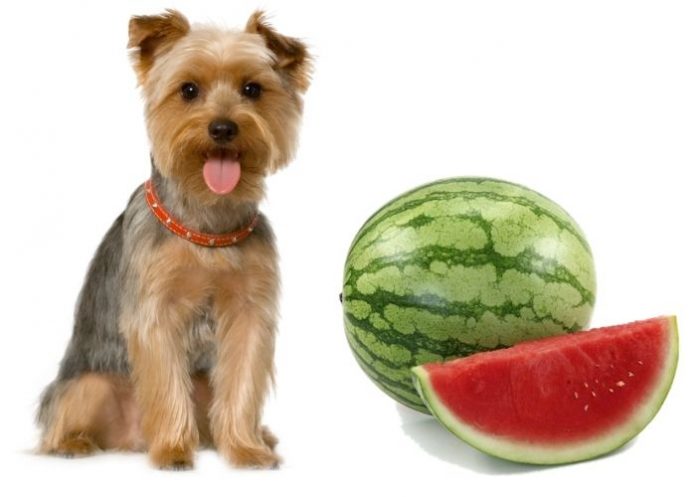Can Dogs Eat Watermelon? As for the fruit is in no way contraindicated. The fruit is a healthy source of food, low in calories, and lots of nutrients: vitamins A, B6 and C, and potassium, so it is an energy source and healthy for our puppies. But yes, you have to take precautions.
Seeds
The seeds could cause intestinal obstruction, so be sure to remove them before offering the watermelon. And, more than likely, it is also not a good idea to allow the dog to chew the shell, because it can cause indigestion.
Fruits in general, and watermelon in particular, have very few calories and a high percentage of water, making it ideal for hydrating on a hot day. It has neither fat nor cholesterol.
When it comes to issuing seeds, seedless melons have been on the market for many years, so it is an option to save on work and gain safety, however, you need to take precautions as these melons are not always exempt from use.
Benefits of watermelon for dogs
The water content of about 92%, a lot of vitamins and minerals, and a few calories make it an ideal snack for any time of day. In order for our dogs to take full advantage of it, it is necessary to remove the shell and seeds.
Watermelons, unlike other fruits, contain low levels of sugar, so there is no risk of blood sugar in your puppy.
Watermelon for dogs: Possible side effects
Consumption of watermelon for dogs should be limited to pulp only. Before going to a meal, it is necessary to remove all seeds and shells.
Watermelon does not contain toxic substances for dogs, however, the shell has a hard consistency, it is difficult to digest.
The seeds, meanwhile, are not digestible, so they can produce stomach obstruction. To avoid this risk, it is best to offer a seedless variety of watermelon.
Finally, watermelon is low in calories and should not be considered a major ingredient in your diet, due to the risk of causing nutritional deficiencies.
How to offer watermelon to our dogs
Watermelon is a great prize option for our dogs. Its large water supply makes it an ideal treat that will keep them hydrated as well. Watermelon can be eaten by an adult dog, like a puppy, without any problems.
The best way to offer it is fresh, freshly peeled and without seeds and shells. You can also freeze them to pieces or drizzle to turn them into delicious frozen desserts.
Although you may choose to cook them, the truth is that they do not recommend it, apart from its taste, you will also lose some of its water.
Remember to start with small meals and watch for any signs of allergies or an upset stomach. Always consult a veterinarian before introducing new foods to your pet.
Watch out for fructose
Your dog is more sensitive to fructose than a human can be. So, if experts have already determined that sugar is a metabolic poison for you, imagine what it can do with your pet.
You need to limit the amount of sweet fruit in your dog’s diet, and above all take into account that the dose should be small and related to its size and weight.
Can I give fruit to my dog?
Watermelon is not just fructose and that is why it is not bad to give it to your furry friend, because this abundant fruit also contains the benefits of vitamins and minerals, as well as probiotics, which is necessary for maintaining the health of the intestinal flora.
So your dog also deserves to enjoy a crunchy, excellent and juicy watermelon, especially on summer days when the temperature is rising and everyone, including our pets, is very thirsty.
Natural fruit for the dog
Watermelon has a lot of vitamins that will give your four-legged friend a lot of energy. It has a low-calorie content and at the same time will give you nutrients that will keep you more playful.
In fact, many dog owners have reported that they have lost important nutrients with commercial food, so they have decided to supplement their pets ’diet with fruits like watermelon.
Commercial foods do not contain antioxidants and other vitamins and nutrients that contain natural foods such as watermelon.
It is those components present in a delicious watermelon that can ensure the health of your dog in the long run.
And that is that a good and ripe watermelon is a food that is in its original state and preserves essential nutrients and antioxidants to boost your dog’s immune system.
From the puppy can eat dog watermelon
Watermelon can prevent diseases like cancer or heart disease in your dog. Watermelon also contains fiber, and although your dog does not need too much, taking small amounts will benefit his digestive system.
The idea is then to include watermelon in the diet of your furry companion because he is a puppy because that will be the key to accepting this wonderful fruit. When a dog eats a puppy’s watermelon, he will get used to it and eat it with pleasure without having to mix it with other food.
A good tip to follow is to cut the watermelon into pieces to prevent the peel from resisting the cans.
Essential antioxidants for the animal
Foods that provide antioxidants are a must not only in the human diet but also in your dog’s food. That red pigment found in the juicy flesh of watermelon is lycopene, a valuable antioxidant that has an insurmountable effect on free radicals.
Product for cleaning
You can give your dog watermelon juice to quench the thirst of a hot day. But this fruit is also recognized as a magnificent natural means of cleaning dog teeth.
Watermelon contains chlorophyll, that is very good for your pet’s blood while removing excess fluid due to its diuretic properties.
Can dogs eat watermelon peel?
No, dogs can’t eat barking. While humans are said to have health benefits, watermelon peel will be very difficult for dogs to digest and can lead to gastrointestinal problems. So be sure to give your dog only a meaty portion of this fruit.
Healthy fruits for dogs: Blueberries and blackberries
They are excellent and full of vitamins and antioxidants, but we should only give them once from time to time, because in excessive or continuous-time they may not be helpful.
Remember that there are also fruits that you should NEVER eat because it is very poisonous to them like grapes. We invite you to take a look at the list of highly toxic foods for your dog: Toxic and forbidden foods for our dogs.
Watermelon for dogs: Some precautions.
In these articles, we have often dealt with the question of fruit seeds, and the subject is unpleasantly infiltrated even here. Basically, a lot of fruit seeds (in concentrated amounts) can be very harmful to your dog.
Like other seeds, watermelon seeds contain cyanide. (Others are known as cyanogenic glycosides, a harmful natural product that dogs cannot eat).
When dogs eat watermelon seeds after that can have stomach aches. Too many seeds at once, or a prolonged diet with them, will undoubtedly cause serious stomach problems for the dog.
Can dogs eat watermelon? Concluding remarks Until the seeds are removed and for safety reasons the skin is removed, your dog will surely enjoy his juicy watermelon. Great summer snack.
How much watermelon can I give my dog?
Like any fruit that dogs are safe to eat, a dog should be given watermelon only in moderation. The reason for this is that dogs cannot digest fruit as we do, so large amounts can cause indigestion and lead to diarrhea.
When you bring this fruit to your dog, start slowly. Start with 1 or 2 small 1-inch wedges. If your dog has no digestive problems, you can gradually increase this amount. However, I would not advise giving your dog more than 4 or 5 1 inch pegs in one session.
When you give this fruit to a dog, it should only be considered a gift. You will still need your quality dog food to ensure your daily protein intake.





